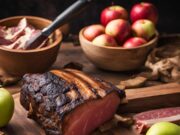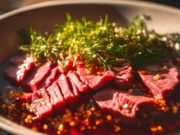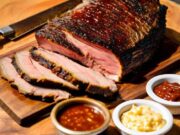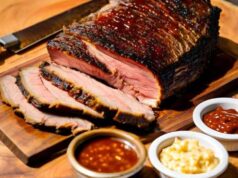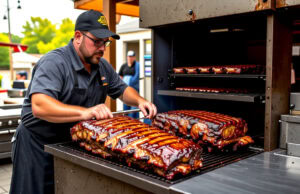When it comes to barbecue, utilizing the right flavor enhancers can elevate a simple meal into an unforgettable feast.
This guide examines essential herbs, spices, and condiments that can significantly enhance your BBQ skills, adding depth and complexity to your dishes. You will discover the unique roles of various flavor enhancers, learn effective seasoning techniques, and receive tips on creating your own custom blends.
Whether you are a seasoned pitmaster or a backyard novice, this information will assist you in unleashing remarkable flavors that will impress your guests and make your BBQ the talk of the town.
Key Takeaways:
- Incorporating herbs, spices, and condiments is crucial for enhancing the flavor of BBQ dishes.
- Dry and wet seasoning techniques, such as using rubs and marinades, can significantly enhance the taste of BBQ.
- By creating your own seasoning blends and properly storing your flavor enhancers, you can elevate the taste of your BBQ to the next level.
Types of Flavor Enhancers
You can categorize the types of flavor enhancers in BBQ into three main groups: herbs, spices, and condiments. Each category offers unique benefits and flavor profiles that can significantly enhance the taste of your dishes.
Herbs provide freshness through their natural oils, while spices contribute depth to the overall flavor. Condiments can introduce acidity or sweetness, resulting in a well-rounded flavor palette. For more information on natural flavor enhancers for BBQ, check out this article.
Herbs and Their Role in BBQ
Herbs are essential in BBQ cooking, serving not only as aromatic elements but also as key enhancers of flavor for meats and vegetables when grilled or smoked. Culinary herbs such as thyme, oregano, and parsley provide fresh, vibrant notes while also contributing health benefits, ensuring that your BBQ meals are both delicious and nutritious.
You can utilize these herbs in various forms, with fresh herbs typically offering a brighter, more intense flavor profile compared to their dried counterparts. For example, fresh basil can impart a sweet, peppery brightness to grilled chicken, while dried basil tends to mellow during cooking, providing a more subtle flavor hint.
Rosemary, with its strong, fragrant needles, is ideal for rubbing on beef or lamb before grilling, as it imparts a woody aroma that complements the smoky elements of BBQ. Thyme offers earthy notes that work wonderfully in marinades or as a garnish, enhancing the overall dish with added depth. Meanwhile, dill brings a refreshing tang, particularly effective in lighter fare such as grilled vegetables or fish.
Each of these herbs possesses unique properties that can significantly alter the outcome of a BBQ experience, making them critical companions for any grill master.
Spices that Elevate Your BBQ
Spices serve as the backbone of flavor in BBQ, with options such as paprika, cayenne pepper, and chili powder contributing the heat and depth that make your dishes truly memorable. When used thoughtfully, spices can amplify the smoky flavor of meats, enhance the overall taste experience, and create complex layers of flavor that delight the palate.
Each spice brings its unique characteristics to the BBQ table. For instance, paprika adds vibrant color and a subtle sweetness, while cayenne pepper brings a fiery kick that can be balanced with sweet elements like brown sugar in a spice blend. Chili powder, often a mix of spices, provides warmth and richness, making it an essential ingredient in marinades or dry rubs. Combining these spices with herbs like oregano or thyme can result in a well-rounded flavor profile.
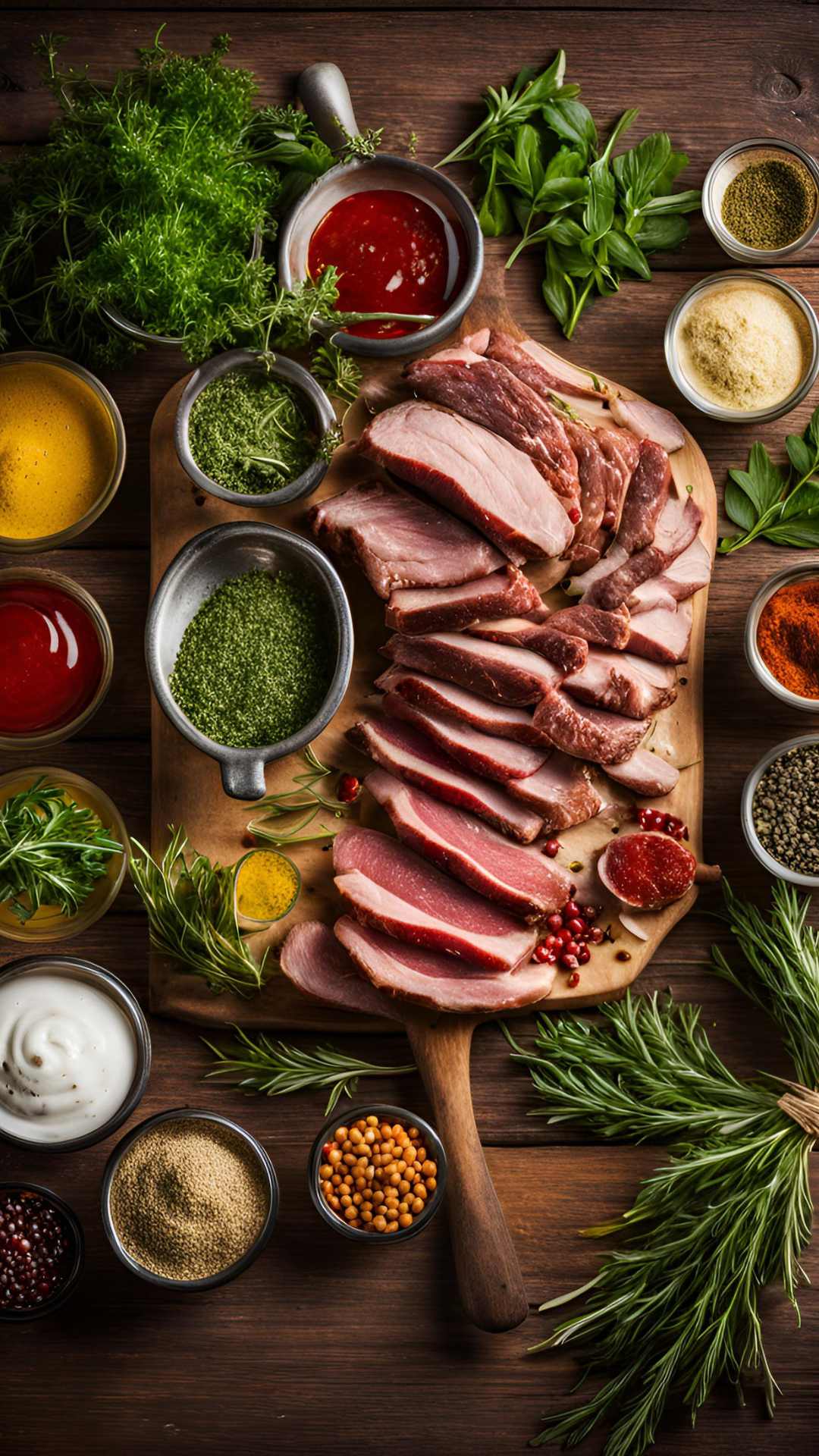
For a classic BBQ rub, consider a combination of smoked paprika, garlic powder, and cumin. This blend not only enhances the taste of grilled meats but also transforms vegetables and tofu into flavorful dishes.
Condiments for Flavor Boosting
Condiments play a crucial role in BBQ, serving as flavor enhancers that can elevate a dish from bland to vibrant. Whether you opt for sauces, marinades, or simple dressings, these components add acidity, sweetness, and richness that beautifully complement the natural flavors of grilled meats and vegetables.
Barbecue sauces come in various styles, ranging from the tangy vinegars characteristic of Carolina BBQ to the thick, sweet tomato-based sauces favored in Kansas City. Marinades are essential for tenderizing meat while imparting flavor; a classic example is a citrus and herb marinade that enhances the taste of chicken or pork. Dressings also have their place at the table, with a zesty coleslaw dressing adding both crunch and brightness to any BBQ spread.
Combining these elements can result in delightful pairings, such as marinating ribs overnight in a spicy garlic sauce before slow-cooking, then applying a glaze of sweet, smoky BBQ sauce just before serving.
Dry vs. Wet Seasoning Techniques
In terms of flavoring meats for BBQ, it is essential for you to understand the difference between dry and wet seasoning techniques to achieve the best results.
Dry seasoning involves applying a combination of spices and herbs directly to the surface of the meat, while wet seasoning typically incorporates liquid ingredients such as oils or sauces to marinate the meat and infuse it with flavor.
Using Dry Rubs Effectively
Using dry rubs effectively can significantly enhance the flavor of grilled meats, creating a delicious crust and elevating the overall taste experience. A well-balanced dry rub typically consists of a mix of spices such as chili powder, garlic powder, and paprika, combined with salt and pepper for seasoning, which contributes to a flavorful, smoky finish.
To create the perfect dry rub, it is essential to get the ingredient ratios right; a combination of one part salt, one part sugar, and two parts spices tends to yield excellent results. Apply the rub generously, ensuring that every surface of the meat is evenly coated for maximum flavor.
For optimal results, allowing the seasoned meat to rest for at least 30 minutes to an hour before cooking enables the spices to penetrate, resulting in deeper flavors. Consider experimenting with additional herbs like thyme or rosemary to customize your blend. Remember, patience and creativity in seasoning can lead to an exceptional culinary experience.
Marinades: When and How to Use Them
Marinades are an excellent way for you to infuse meats with flavor and tenderness, making them an essential element in the BBQ cooking process. A good marinade typically contains acids like vinegar or citrus juice, oils, and a combination of herbs and spices, all working together to enhance the natural flavors and moisture of the meat.
Choosing the right components is crucial; for instance, a robust marinade featuring soy sauce and garlic is ideal for beef, while a lighter mixture of lemon juice and dill pairs beautifully with chicken. Seafood, known for its delicate nature, generally requires shorter marinating times—around 15 to 30 minutes—compared to heartier meats like pork, which benefit from soaking for several hours or even overnight.
Popular marinade recipes might include a honey mustard blend for chicken or a spicy jerk marinade for pork. By understanding the nuances of various meat types, you can elevate your dishes to new heights of flavor, ensuring each bite is nothing short of delicious.
Creating Your Own BBQ Seasoning Blends
Creating your own BBQ seasoning blends enables you to customize flavors to align with your taste preferences, ensuring that your dishes stand out at any cookout. By combining ingredients such as smoked paprika, cayenne, garlic powder, and a selection of fresh herbs, you can develop a unique blend that enhances the flavor of grilled meats and vegetables.
This process not only adds a personal touch to your meals but also encourages you to experiment with different textures and intensities. Start by selecting a base spice, then consider which additional herbs can complement it. For example, oregano or thyme can bring earthiness, while a hint of brown sugar can introduce sweetness.
Incorporating other ingredients, such as onion powder or lemon zest, allows you to create layers of flavor that cater to diverse palates. Remember to taste as you go, allowing the blend to evolve until it meets your standards. Adjusting the ratios will help you achieve the perfect balance, inviting your guests to thoroughly enjoy every bite.
Storage Tips for Herbs and Spices
Proper storage of herbs and spices is essential for maintaining their freshness and potency, which directly influences their effectiveness as flavor enhancers in BBQ cooking. By storing these ingredients in cool, dark places and utilizing airtight containers, you can ensure they retain their natural flavors and health benefits for extended periods.
For dried herbs and spices, such as oregano or paprika, it is advisable to use glass jars with tight-fitting lids, as this helps keep moisture at bay. Labeling these containers with the date of purchase is important, as spices typically lose their potency over time.
Fresh herbs, like basil or cilantro, should be stored in the refrigerator, ideally wrapped in damp paper towels and placed in perforated bags. This method allows for airflow while preventing excess moisture, thereby extending their shelf life.
Ultimately, understanding the specific needs of each herb or spice can significantly enhance your culinary creations.
Frequently Asked Questions
What are natural flavor enhancers?
Natural flavor enhancers are ingredients that are used to enhance the taste and aroma of food without the use of artificial additives or preservatives. They are usually derived from plants and can add depth and complexity to dishes.
What are some commonly used herbs for BBQ?
Some commonly used herbs for BBQ include rosemary, thyme, oregano, and sage. These herbs not only add flavor to the meat, but also have anti-inflammatory and antibacterial properties.
Which spices are best for adding heat to BBQ dishes?
Cayenne pepper, chili powder, and red pepper flakes are great spices for adding heat to BBQ dishes. They can be used in marinades, rubs, and sauces to give a kick of spice to your BBQ.
What are some natural condiments that can be used for BBQ?
Some natural condiments that can be used for BBQ include mustard, honey, and apple cider vinegar. These ingredients can add tanginess, sweetness, and acidity to your BBQ dishes without any artificial flavors or additives.
How can I incorporate natural flavor enhancers into my BBQ cooking?
There are many ways to incorporate natural flavor enhancers into your BBQ cooking. You can use them in marinades, rubs, sauces, or simply sprinkle them on top of the meat while grilling. You can also experiment with different combinations to find your perfect flavor profile.
Are natural flavor enhancers healthier than artificial additives?
Yes, natural flavor enhancers are generally healthier than artificial additives. They are usually lower in sodium and do not contain any artificial colors or flavors. They also offer additional health benefits, such as anti-inflammatory and antioxidant properties found in many herbs and spices.



